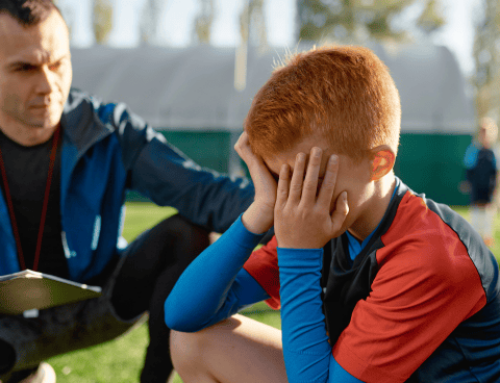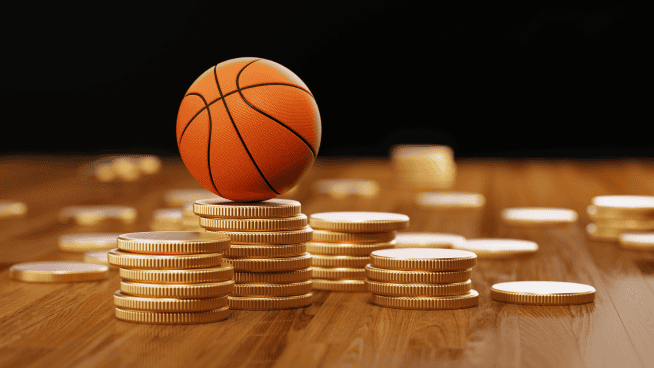Athletes Are Less Mentally Resilient Than Ever. Here’s How to Change It
When many of us hear the words “mental toughness,” we automatically envision someone “breathing and visualizing” their way through tough times.
That’s not really how it works. I’ve worked with close to 5,000 athletes, both at the youth and professional levels, to help them truly build their mental resiliency and tap into their extra gear.
We’re in a time where self-esteem is at an all-time low. Athletes are all getting bigger, faster and stronger, but they lack resiliency. Without having the true mindset of a limitless individual, or someone who is able to get knocked down 9 times only to stand up 10, your “bigger, faster and stronger” traits are largely useless.
I want to define what true resiliency is and the traits that define those who have it. To be completely honest, I think the term “resiliency” is one of the most misunderstood terms in the performance world. It’s often too superficial and too general, and it goes far beyond avoiding injury or consistently filling the stat sheet.
To start with the basics, being resilient is simply having the ability to recover, or bounce back, quickly from undesirable conditions. From my experience, resiliency is having the ability to adapt. It is just being able to “keep moving” regardless of what happens. It is being able to control the “controllables,” in turn allowing you to control the “uncontrollables.” It is the trait that the best of the best possess, and one that you need to start investing in now if you want yourself or your athletes to perform at high levels.
There are four major traits to invest in when building your resiliency:
- Self-esteem
- Self-reflection
- Competence
- Laser Focus.
All of these are completely inexpensive traits to work on, and ones you can build independently. There is literally no excuse not to start investing in these traits. Either you want resiliency, or you do not.
1. Build Your Self-Esteem
Self-esteem is having a positive outlook on yourself based on the skills that you possess.
Lesson one: Invest in yourself to build true skills. Do you know what you are truly good at? Do you know what skills you possess that can boost you to the next level? A mentally resilient individual can adapt no matter what because they truly trust the skills they possess. As a result of working on new skills, or brushing up on any old ones, your self-esteem increases, which allows you to perform without thinking; you’re instinctive now.
Building self-esteem comes from hundreds of hours of hard work, and self-esteem and confidence go hand in hand. If you don’t have much self-esteem, you’re more likely to shy away from competition, beginning a cycle that can continuously keep you from reaching your full potential.
2 . Self-Reflect to Get Ahead
Self-reflection is simply looking deeply at yourself or your performances.
Keep it simple: Have a pre-performance focus/purpose. Ask yourself, “What is my purpose? What skill am I focusing on? How am I going to execute it today?” Once you’re finished with your performances, complete a post-performance reflection and ask yourself, “Did I accomplish what I want? What did I do well? What do I need to get better at, and how will I act on it tomorrow?”
A mentally resilient individual understands themselves well; they know when they can go all-in and when they need to tone back. The more you reflect, the more self-esteem you build, and the more self-awareness you have going into performance.
3. Build Your Competence
“Competence is confidence.” Simply put: The more you know about a situation or the environment you need to perform in, the more confident you become.
Keep it simple: Understand your role, understand what you need to do in the environment to help your team win and understand who you are performing against. A mentally resilient performer is one who knows their job and sticks to it; they don’t do too much and overcompensate. Instead, they do the right amount, allowing them to perform effortlessly and effectively.
The New England Patriots are consistently one of the most mentally resilient teams in sports, largely because they live by the simple mantra of “Do Your Job.”
4. Create a Laser Focus
In the modern age, almost none of us focus well.
We think we do, but we truly don’t. Think of how many times you’ve been working to finish a project but became side tracked by social media or some other external factor.
Or during a performance when you lost focus on the task at hand because you started paying too much attention to what your opponent was doing.
Laser focus is simple enough to develop: Understand the one or two roles you have to play in your team’s performance, then go do it. No matter what happens, keep going back to your roles; don’t get side tracked. True focus is just eliminating distractions. Don’t get caught up in doing things that are irrelevant–focus on your role. And if you make a mistake, do not try to make up for it—this just causes more distractions. Instead, get back to your main focuses.
There you have it. These four simple traits can help young athletes build better mental resiliency. Determine what improvements could help raise your self-esteem, then work hard to make them. Self-reflect both before and after performances, identifying things you did well and what could’ve been better. Build competence through excellent preparation and awareness. And finally, work on building an unshakeable focus by ignoring distractions, identifying your role, and executing it.
Be honest with yourself, continue to invest in your own skills, and keep pushing for your results. When you have a plan in place, getting where you want to be becomes a whole lot easier.
READ MORE:
RECOMMENDED FOR YOU
MOST POPULAR
Athletes Are Less Mentally Resilient Than Ever. Here’s How to Change It
When many of us hear the words “mental toughness,” we automatically envision someone “breathing and visualizing” their way through tough times.
That’s not really how it works. I’ve worked with close to 5,000 athletes, both at the youth and professional levels, to help them truly build their mental resiliency and tap into their extra gear.
We’re in a time where self-esteem is at an all-time low. Athletes are all getting bigger, faster and stronger, but they lack resiliency. Without having the true mindset of a limitless individual, or someone who is able to get knocked down 9 times only to stand up 10, your “bigger, faster and stronger” traits are largely useless.
I want to define what true resiliency is and the traits that define those who have it. To be completely honest, I think the term “resiliency” is one of the most misunderstood terms in the performance world. It’s often too superficial and too general, and it goes far beyond avoiding injury or consistently filling the stat sheet.
To start with the basics, being resilient is simply having the ability to recover, or bounce back, quickly from undesirable conditions. From my experience, resiliency is having the ability to adapt. It is just being able to “keep moving” regardless of what happens. It is being able to control the “controllables,” in turn allowing you to control the “uncontrollables.” It is the trait that the best of the best possess, and one that you need to start investing in now if you want yourself or your athletes to perform at high levels.
There are four major traits to invest in when building your resiliency:
- Self-esteem
- Self-reflection
- Competence
- Laser Focus.
All of these are completely inexpensive traits to work on, and ones you can build independently. There is literally no excuse not to start investing in these traits. Either you want resiliency, or you do not.
1. Build Your Self-Esteem
Self-esteem is having a positive outlook on yourself based on the skills that you possess.
Lesson one: Invest in yourself to build true skills. Do you know what you are truly good at? Do you know what skills you possess that can boost you to the next level? A mentally resilient individual can adapt no matter what because they truly trust the skills they possess. As a result of working on new skills, or brushing up on any old ones, your self-esteem increases, which allows you to perform without thinking; you’re instinctive now.
Building self-esteem comes from hundreds of hours of hard work, and self-esteem and confidence go hand in hand. If you don’t have much self-esteem, you’re more likely to shy away from competition, beginning a cycle that can continuously keep you from reaching your full potential.
2 . Self-Reflect to Get Ahead
Self-reflection is simply looking deeply at yourself or your performances.
Keep it simple: Have a pre-performance focus/purpose. Ask yourself, “What is my purpose? What skill am I focusing on? How am I going to execute it today?” Once you’re finished with your performances, complete a post-performance reflection and ask yourself, “Did I accomplish what I want? What did I do well? What do I need to get better at, and how will I act on it tomorrow?”
A mentally resilient individual understands themselves well; they know when they can go all-in and when they need to tone back. The more you reflect, the more self-esteem you build, and the more self-awareness you have going into performance.
3. Build Your Competence
“Competence is confidence.” Simply put: The more you know about a situation or the environment you need to perform in, the more confident you become.
Keep it simple: Understand your role, understand what you need to do in the environment to help your team win and understand who you are performing against. A mentally resilient performer is one who knows their job and sticks to it; they don’t do too much and overcompensate. Instead, they do the right amount, allowing them to perform effortlessly and effectively.
The New England Patriots are consistently one of the most mentally resilient teams in sports, largely because they live by the simple mantra of “Do Your Job.”
4. Create a Laser Focus
In the modern age, almost none of us focus well.
We think we do, but we truly don’t. Think of how many times you’ve been working to finish a project but became side tracked by social media or some other external factor.
Or during a performance when you lost focus on the task at hand because you started paying too much attention to what your opponent was doing.
Laser focus is simple enough to develop: Understand the one or two roles you have to play in your team’s performance, then go do it. No matter what happens, keep going back to your roles; don’t get side tracked. True focus is just eliminating distractions. Don’t get caught up in doing things that are irrelevant–focus on your role. And if you make a mistake, do not try to make up for it—this just causes more distractions. Instead, get back to your main focuses.
There you have it. These four simple traits can help young athletes build better mental resiliency. Determine what improvements could help raise your self-esteem, then work hard to make them. Self-reflect both before and after performances, identifying things you did well and what could’ve been better. Build competence through excellent preparation and awareness. And finally, work on building an unshakeable focus by ignoring distractions, identifying your role, and executing it.
Be honest with yourself, continue to invest in your own skills, and keep pushing for your results. When you have a plan in place, getting where you want to be becomes a whole lot easier.
READ MORE:











